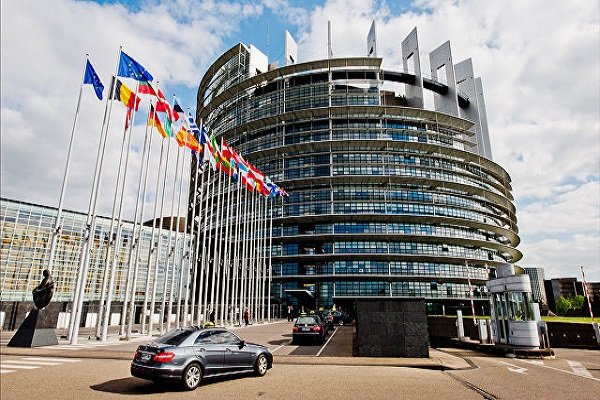Iran: EU Parliament statement meant to hurt bilateral relations

TEHRAN - Tehran said on Wednesday the recent antagonistic statement by the European Parliament was lobbied by a “terrorist group” in an effort to mar thriving relations between Iran and the European Union.
In a strongly worded communique on Monday, a number of European parliamentarians rapped Iran for what they described as “human rights violations”, calling for the blacklisting of the Islamic Revolutionary Guards Corps (IRGC), the country’s constitutionally enshrined military force.
“A few members of the European Parliament notorious for having links to some dissident groups and the MKO terrorist group have been trying to take advantage of their position to put forward untrue claims about the human rights situation in Iran,” Iranian Foreign Ministry spokesman Bahram Qassemi stated.
Designated by Iran as a terrorist organization, the MKO, otherwise known the People’s Mujahidin Organization of Iran (PMOI), took up arms against the Iranian government after the 1979 revolution and assassinated dozens of its top officials.
The MKO also sided with Saddam Hussein during the Iraqi invasion of Iran in the 1980s but fell out of favor with Baghdad after the then Iraqi president was dethroned by the U.S.-led invasion in 2003.
“Continuing its past actions and fabricating untrue figures like in the past, the MKO has, in a hypocritical move, as always, published the names of certain European Parliament members as supporters of the aforesaid statement without their knowledge and signatures,” said the spokesman.
The statement was backed by a list of 265 parliamentarians from different political tendencies and groups.
The U.S. delisted the MKO from foreign terrorist organizations in 2012 after 15 years. Also, it was listed as a terrorist organization by the European Union until recently.
Under a deal brokered by the United States and the United Nations refugee agency, almost 2,000 MKO members were resettled in nearly a dozen European countries since the start of 2016 after the closing of their camps in Iraq.
In July 2016, Iran summoned the French ambassador to protest about a meeting held in Paris by exiled MKO members who wished for the overthrow of the Islamic Republic.
Relations between Tehran and Europe has gone through conceptual, progressive shifts at the wake of the 2015 international nuclear deal.
The nuclear accord has opened avenues for dialogue on other stumbling blocks, including the human rights, with two rounds of negotiation already held.
The talks are in conformity with an EU strategy document in 2016 which calls for the establishment of working committees for “a more credible and effective exchange” on a range of issues, including the human rights.
The EU parliament’s statement furthermore attacked the IRGC for getting involved in “internal suppression” and destabilizing the Middle East region, which Iran roundly rejects.
Qassemi said the Iranian Armed Forces, including the IRGC, will continue to incessantly fight terrorist and Takfiri currents in the region without paying attention to the ballyhoo raised by supporters of criminal terrorists.
On June 18, the IRGC launched six medium-range ballistic missiles into eastern Syria, targeting Islamic State fighters in retaliation for the twin attacks that rocked Tehran on June 7.
Killing at least 70 terrorists, the strikes were Iran’s first missile launches at another country since the end of war with Iraq in 1988.
The spokesman also considered the move as a disgrace to the European body’s “dignity”, saying, “Iran believes the issuance of such unfounded and invalid statements will tarnish the status and dignity of the European Parliament; so, Iran expects European Parliament lawmakers to deal with the masterminds of such statements with sensitivity, thoughtfully and carefully,” he said.
PA/PA
